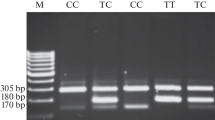Abstract
We undertook a case–control study to examine the possible associations of the TP53 variants Arg>Pro at codon 72 and p53PIN3, a 16 bp insertion/duplication in intron 3, with the risk of colorectal cancer (CRC). The p53PIN3 A2 allele (16 bp duplication) was associated with an increased risk (OR 1.55, 95% CI 1.10−2.18, P=0.012), of the same order of magnitude as that observed in previous studies for other types of cancer. The Pro72 allele was weakly associated with CRC (OR=1.34, 95% CI 0.98−1.84, P=0.066). The possible functional role of p53PIN3 was investigated by examining the TP53 mRNA transcripts in 15 lymphoblastoid cell lines with different genotypes. The possibility that the insertion/deletion could lead to alternatively spliced mRNAs was excluded. However, we found reduced levels of TP53 mRNA associated with the A2 allele. In conclusion, the epidemiological study suggests a role for p53PIN3 in tumorigenesis, supported by the in vitro characterization of this variant.

Similar content being viewed by others
References
Brunak S, Engelbrecht J and Knudsen S . (1991). J. Mol. Biol., 220, 49–65.
Cox DG and Canzian F . (2001). Bioinformatics, 17, 738–739.
Dumont P, Leu JI, Della Pietra AC, George DL and Murphy M . (2003). Nat. Genet., 33, 357–365.
Excoffier L and Slatkin M . (1995). Mol. Biol. Evol., 12, 921–927.
Hebsgaard SM, Korning PG, Tolstrup N, Engelbrecht J, Rouze P and Brunak S . (1996). Nucleic Acids Res., 24, 3439–3452.
Landi S, Moreno V, Gioia-Patricola L, Guino E, Navarro M, de Oca J, Capella G and Canzian F . (2003). Cancer Res., 63, 3560–3566.
Lazar V, Hazard F, Bertin F, Janin N, Bellet D and Bressac B . (1993). Oncogene, 8, 1703–1705.
Powell BL, van Staveren IL, Roosken P, Grieu F, Berns EM and Iacopetta B . (2002). Carcinogenesis, 23, 311–315.
Rogan PK, Faux BM and Schneider TD . (1998). Hum. Mutat., 12, 153–171.
Runnebaum IB, Tong XW, Konig R, Zhao H, Korner K, Atkinson EN, Kreienberg R, Kieback DG, Hong Z and Zhao H . (1995). Lancet, 345, 994.
Storey A, Thomas M, Kalita A, Harwood C, Gardiol D, Mantovani F, Breuer J, Leigh IM, Matlashewski G and Banks L . (1998). Nature, 393, 229–234.
Tõnisson N, Zernant J, Kurg A, Pavel H, Slavin G, Roomere H, Meiel A, Hainaut P and Metspalu A . (2002). Proc. Natl. Acad. Sci. USA, 99, 5503–5508.
Wang-Gohrke S, Becher H, Kreienberg R, Runnebaum IB and Chang-Claude J . (2002). Pharmacogenetics, 12, 269–272.
Wang-Gohrke S, Weikel W, Risch H, Vesprini D, Abrahamson J, Lerman C, Godwin A, Moslehi R, Olipade O, Brunet JS, Stickeler E, Kieback DG, Kreienberg R, Weber B, Narod SA and Runnebaum IB . (1999). Br. J. Cancer, 81, 179–183.
Weston A, Pan CF, Ksieski HB, Wallenstein S, Berkowitz GS, Tartter PI, Bleiweiss IJ, Brower ST, Senie RT and Wolff MS . (1997). Cancer Epidemiol. Biomarkers Prev., 6, 105–112.
Wu X, Zhao H, Amos CI, Shete S, Makan N, Hong WK, Kadlubar FF and Spitz MR . (2002). J. Natl. Cancer Inst., 94, 681–690.
Acknowledgements
Federica Gemignani is a recipient of a fellowship from the International Association for the Study on Lung Cancer (IASLC), part of the Cancer Research Foundation of America (CRFA). Stefano Landi is a recipient of a Marie Curie fellowship (HPMFCT-2000-00483) from the European Commission. S Gutièrrez-Enriquez and N Moullan are recipients of Special Training Awards from the International Agency for Research on Cancer. This work was partially funded by grants from the Maraton of TV3 48/95, Fondo de Investigaciones Sanitarias FIS 96/0797, FIS 00/0027, FIS 01/1264 and SAF 00/81, and Association pour la Recherche sur le Cancer #7478.
Author information
Authors and Affiliations
Corresponding author
Rights and permissions
About this article
Cite this article
Gemignani, F., Moreno, V., Landi, S. et al. A TP53 polymorphism is associated with increased risk of colorectal cancer and with reduced levels of TP53 mRNA. Oncogene 23, 1954–1956 (2004). https://doi.org/10.1038/sj.onc.1207305
Received:
Revised:
Accepted:
Published:
Issue Date:
DOI: https://doi.org/10.1038/sj.onc.1207305
- Springer Nature Limited
Keywords
This article is cited by
-
TP53 and p21 (CDKN1A) polymorphisms and the risk of systemic lupus erythematosus
Advances in Rheumatology (2023)
-
Importance of TP53 codon 72 and intron 3 duplication 16 bp polymorphisms and their haplotypes in susceptibility to sarcopenia in Iranian older adults
BMC Geriatrics (2022)
-
Both p53 codon 72 Arg/Arg and pro/Arg genotypes in glioblastoma multiforme are associated with a better prognosis in bevacizumab treatment
BMC Cancer (2020)
-
Association of PIN3 16-bp duplication polymorphism of TP53 with breast cancer risk in Mali and a meta-analysis
BMC Medical Genetics (2020)
-
Linkage disequilibrium and haplotypes of five TP53 polymorphisms in oesophageal cancer patients
Journal of Genetics (2020)



